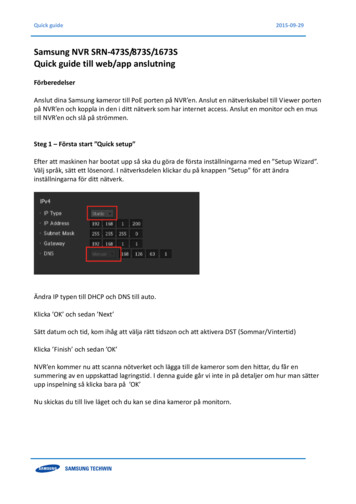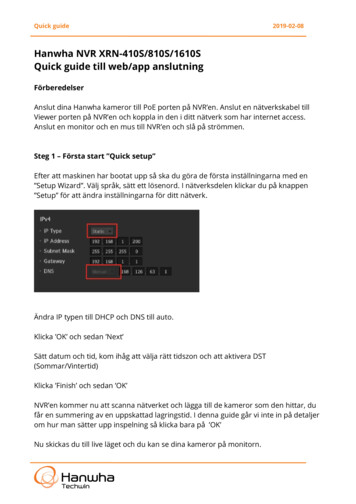
Transcription
Step by step Guide forBuyingA HomeWhat’s Inside Know Your “Must Have” Features Determine What You Can Afford The 12 Steps of a Successful Close Understanding & Qualifying for aMortgage Securing a Loan Deed & Titles Defined What You Should Know AboutHomeowners Insurance Protect Your Investment with TimelyMaintenanceHOMESandLAND.com
HOME BUYINGSIMPLIFIEDCreate a “Must-Have” Checklist BeforeYou Start To Make the Search Easier.Looking for a home to buy is similar to any shoppingexcursion. You can either impulse buy and risk buyer’sremorse, or target your needs and find the perfect house.Before you shop, arm yourself with a list of priorities.Evaluating Prospective HomesAfter setting your priorities, begin your search onHomesAndLand.com and in each issue of Homes & LandMagazine. As you find homes of interest, put them in afile and note which features match your list of needs.Compare each listing with your graded priorities. Focus onyour “A” items, and your “must-haves.”Buyers ChecklistFocus on the features that are most importantto you. Using the letters A through D, gradeeach item below by level of priority.A MandatoryB NeutralC No DesireD Deal BreakerOne StoryTwo StoryMinimum Number of BedroomsMinimum Number of BathroomsJacuzzi TubSeparate ShowerHalf BathGarage for CarsCarportGreat RoomFormal Living RoomFormal Dining RoomUpgraded Kitchen AppliancesGranite or Upgraded Kitchen CountertopsBreakfast NookStorage/Closet SpaceBasementBonus Room/Play RoomFireplaceHardwood FloorsInside Laundry RoomCovered PorchOutside DeckBrick ExteriorSiding ExteriorWood ExteriorStucco ExteriorHardie Board ExteriorSwimming PoolFenced YardLarge YardLandscaped YardNatural Gas (water heater, kitchen, fireplace)Septic TankSewer SystemWaterfront PropertyGolf Course PropertyLocated in school zone(s)Close to public transportationLocated within miles from workLocated within miles fromLocated in a homeowners’ associationHOMESandLAND.com
how to buy yourDream Homein THE perfect neighborhoodPeople can generally afford a house that costs from twoto three times their annual income. For example, if yourannual household income is 100,000 then you couldafford a house worth 200,000 - 300,000. This is a generalrule of thumb and does not take into account any debt orgeneral lifestyle expenses. Before leaping into a set pricerange, make sure you know the mortgage payment youcan comfortably afford. Create a budget that lists andtotals all of your current financial obligations and livingexpenses.Tip: Working with a lender for pre-approval can be a goodnegotiating tool when making an offer.Mortgage professionals can help you determinespecific payment amounts for mortgage, insurance,taxes and other escrow accounts. This worksheetcan help you formulate your expenses for moreaccurate mortgage advice.ExpensesMonthly AverageAdd the totals together for a more completeaccount of your monthly expenses.Debt ObligationsGrocery billsCredit cardsUtilitiesSchool loansMedicalAutomobile loansSchool expensesAlimonyPet careChild supportEntertainmentExisting mortgagesClothesInsurance policiesTotal MembershipsTotal HOMESandLAND.comPayment Amount
12 steps to asuccessful closeYou found the perfect home, made an offer, and thesellers accepted. Now what? There are numerous stepsto complete a successful closing. This chart provides ageneral overview of the process.Tip: Real estate rules are different in every state and canvary from county to county. Always check with your realestate professional or an attorney to confirm the localrules and regulations.StepWhenWho or WhatWhyHome InspectionImmediately after youroffer is acceptedLook for a certified, reputable home inspectorwith a clean record; one with a construction orengineering background is particularly helpful.Legally, the seller is required to disclose anyknown problems. Inspections can unveil anyunknown or potential problem areas thatmight require repair. Based on the report,you can ask your agent to renegotiate theterms of the contract.Tip: Your real estate professional may be able toprovide you with a list of qualified inspectors.Finalizing theLoan ApplicationProcessImmediately after youroffer is acceptedProvide your lender with all of your financialinformation and other documents throughoutthe mortgage process.Upon finalizing all loan requirements, thelender will lock in your interest rate andprovide you with appropriate paperworkoutlining all commitments.AppraisalDuring the loanapplication processThe buyer’s mortgage company oftenrequires an appraisal. Obtain a list ofapproved appraisers from your lender or youragent.Your lender needs assurance that the priceyou are paying is realistic.SurveyOrder the surveyafter receiving thequalification letterfrom your lenderThe survey is usually ordered by the buyer orthe title company. A copy of the survey usuallyneeds to be sent to your lender.Surveys indicate any easements or boundaryissues with the property and ensure there areno conflicts in ownership.HOMESandLAND.com
StepWhenWho or WhatWhyTermiteInspectionWithin 30 days prior toclosingSellers usually order the termite inspection,though it may fall under the buyer’sresponsibility in some circumstances. Thebuyer should check to see if their lenderrequires a termite report.The homebuyer should be aware of anytermite damage or need for treatment.Sometimes, if termite damage is foundrenegotiation can follow.PurchaseHomeowner’sInsuranceA few weeksbefore closing,or immediately ifproperty is near waterThe buyer must research policy options. Oncea policy is secured, provide the information andpolicy number to your lender.Homeowner’s insurance is required bylenders in order to go to closing. In theevent that something happens to yourproperty, both you and your lender need tobe protected.Title InsuranceBefore closingUsually, the title company or real estate attorneywill order title insurance.Tip: Don’t be fooled if you have newconstruction, there could be an issue with the lot.Title insurance protects your deed/right toownership in case there is a previous claimon the property or unsettled percentage ofownership in past records.To lock in rates.Secure the LoanBefore closingYou and your lender finalize details.Set-Up Utilities &Other ServicesArrange one to twoweeks before closing.The start date can bethe day of closing.Contact the utility provider to arrange fornew service or transfer service for water, gasand electric utilities. Set up phone and otherservices as well.Obtain a HUDStatement24 hours beforeclosingThe title company usually by law, provides thebuyer with a closing statement (also called aHUD 1) the day before closing. The statementshows all buyer and seller costs and proceeds.This is to allow time to review all accountingas applied to the transaction.Get a Cashier’sCheckRight before yourclosing/settlementdateThe buyer should secure a cashier’s checkto cover closing costs and down payment.Personal checks over 500 are not accepted bytitle companies.The exact amount of your closing costs won’tusually be known until the HUD statementis final.Go to ClosingPreparedDay of ClosingBring all relevant monies, paperwork and severalforms of identification to closing.HOMESandLAND.com
The Process ofborrowing MoneyUnderstanding MortgagesQualifying for a MortgageWhen a mortgage is obtained to buy your house, theproperty acts as collateral on the loan. If you defaulton your loan payment, the lender can take possessionof the home to satisfy the debt. The mortgageagreement officially binds the homeowner to the termsof the mortgage which include: principal (the actualloan amount), interest (the additional percentagefor borrowing the principal), property taxes andhomeowner’s insurance.Qualifying for a mortgage is based on several guidelines.First, you will be evaluated on the ratio of your expensesto your household income. As a general rule, monthlyexpenses and long- term debt should not be higher than36% of your household’s gross monthly income.There are two basic types of mortgages containing manyfinancing alternatives.Fixed Rate MortgagesFixed rate mortgages provide loans where the interestrate is locked-in and you will not pay more or less interestif the national rate fluctuates over the time of your loan.Fixed rate mortgages are usually provided in 15 and 30year terms.If your percentage of debt is higher than this, you mayneed to pay off some loans, work toward providing ahigher down payment or consult with your lender todetermine the best approach. The better your credit andfinancial status, the better interest rate and/or higher loanamount will be offered by the financial institution.In addition, the lender will examine all of your financialrecords and accounts as viable proof that you can affordthe home and are a qualified buyer.Adjustable Rate Mortgages (ARM)ARMs usually offer lower interest rates than fixed ratemortgages for the initial life of the loan. After the initialperiod, your interest rate would adjust to the market. Ifyou choose an ARM, be sure that the lender’s programspecifies a cap that restricts your interest rate fromincreasing beyond a specified level.HOMESandLAND.com
obtainingGood Creditand securing aloanWhat is credit, exactly? Credit is your entire financial andpublic records history, such as a car payment, studentloan or credit cards. Anything that would be recordedby the courts such as outstanding taxes, liens on yourproperty, bankruptcy or judgments.Your credit history is recorded by third party companieslike Experian and Equifax . A grade between 300-850 isapplied to your credit history. This grade is known as yourcredit score. The higher your score, the better credit youhave and the greater your likelihood of qualifying for aloan. A mortgage company or bank will check your creditimmediately when you apply for a loan. Therefore, it isimportant to maintain good credit over time.Cleaning Up Your Credit ScoreIf you are a first time buyer and don’t have a credit historyyou can provide the financial institution with anon-traditional report. Make copies of your rental checks,car insurance and utility bills to demonstrate on-timepayment. If you have a history of late payments, this willwork against your credit rating.Finally, it is best to avoid making any large credit cardpurchases or applying for any other loans such as tuitionor car financing when preparing to purchase a home.Once you establish good credit, get pre-approved andpre-qualified with your financial institution.HOMESandLAND.comLOAN SEEKERS CHECKLISTThese are common doccumentsrequired by most lenders.Salary documents – most current W2 and twomost current paycheck stubsVerification of any bonus, commission orstocks cashedIf self-employed, two years of 1099 forms,previous tax returns and balance sheetsCurrent accounts/bank statements; includechecking, savings, money market accounts,401K, IRA or life insuranceDocuments of any retirement or SocialSecurity incomeIf disabled, statement of disability incomeCopies of any rental leases that are in effectA copy of the deed from any other propertyyou might own. If you own free and clear,provide proof such as the satisfaction ofmortgage statement
What’s in a title?Deed & Title DefinedDeed is the written document that conveys one’s legalownership of a property. Your title – essentially yourright to the property – will be properly recorded with thelocal government.How to Protect Your TitleThere is often a long history of ownership behinda property, which is why running a title search andpurchasing title insurance are so important. Once a buyergoes to contract, a real estate attorney or title companyshould perform a title search to access the records ofthe property through the county. They will investigateany possible “cloud” or encumbrance on the title, orany previous claim to ownership that might impede thetransfer of ownership to you. Title insurance protects thebuyer from any loss due to a defect in the title that wasnot previously exposed.What is a Survey?A survey is the procedure by which a property ismeasured to determine its precise boundaries. A surveyconfirms the original lot lines and identifies any otherspecific items that might affect it such as easements,common areas, fences and other structures.Why is an Appraisal Required?An appraisal is simply an estimated value of the homeusually required by the lender. It is required so that thelender has assurance you are paying the proper marketvalue for the home.HOMESandLAND.com
What you should know aboutHomeowner’sinsuranceFinancial Peace of MindPurchasing a homeowner’s insurance policy is both arequirement of your lender and a necessity in life. Ifyour home were destroyed in a fire you would still beresponsible to pay back the loan regardless of how livableyour house is. Beyond this, the most valuable aspect of ahomeowner’s policy is the security of having one of yourlargest financial assets covered. Ultimately, your decisionshould not be based on whether or not to have insurance,but on what level of coverage is most appropriate for yourneeds.There are separate policy programs for single familyhomes, condos, mobile homes and income-producingrental units.Homeowner’s insurance policies usually cover damageto the structure and interior fixtures. If you are buyinga condominium or townhouse, be sure to get a copy ofthe homeowners’ association policy to determine whatis already covered. Often in condo-style living, anythingoutside of the interior walls of the unit such as the roof orsiding may not be your responsibility.Having insurance isn’t enough.Here’s what you should do toprotect your investment Insurance companies can price your policyto cover the actual structure, your personalpossessions, and how much liability coverage youwant. Take inventory of your home. Know its price andconsider how much it would take to rebuild ifnecessary. Determine an estimated value of yourpersonal possessions. Take pictures and inventory of your personalitems and their worth. Keep this file off premises,perhaps in a lock box at the bank along withother important documents. Most homeowner’s insurance policies do notcover flood damage. The flood insurancepolicy often needs to be written separately. Insome coastal areas, flood insurance may not beavailable. Most policies require a deductible to be metbefore reimbursement. You may be eligible for discounts on a premiumif your home has certain safety features or fallsinto categories established by the insurancecompany. These items could include: a centralsecurity/burglar and/or fire alarm system; fireresistant material like masonry/brick; installedfire extinguishers; home was recently built orrenovated by a licensed contractor.HOMESandLAND.com
Congratulations!Protect Your Investment With ThisHome Maintenance ChecklistCheck, Clean and Service Annually:Drainage, gutters, downspouts, sprinkler systemYour new home is similar to your car in that its’ partswill require regular check-ups. Home maintenance isimportant to ensure everything is operating smoothlyand safely. Taking preventive measures can save time andreduce expenses in the long run. This checklist helps youkeep track of what to monitor in your new home. Markyour calendar so you don’t miss service dates.Lubricate automatic garage mechanismCheck Monthly:Septic systemCheck exterior seals of all doors and windowsGrill parts, valves, gas tankAir conditioning/heat/ fuel tankHot water heaterWater pumpVentsFireplace and chimneyAir filtersPool and JacuzziAttic and basement for water, condensation, moldAny exterior problemsWoodwork for termite damage or rotBroken siding or cracked masonryFireplace and ash if usedRoofing, foundation issuesPlumbing, water pressure, dripsDriveway, walkways, stepsRoof – remove debris and repair loose shinglesPorch, balcony, deckingSump pumpTest Quarterly:Smoke detectorsFire extinguishersSecurity and fire alarm systemsHOMESandLAND.com
Magazine. As you find homes of interest, put them in a . _ Upgraded Kitchen Appliances _ Granite or Upgraded Kitchen Countertops . dreaM hOMe In the PerFeCt neIGhBOrhOOd Mortgage profession











